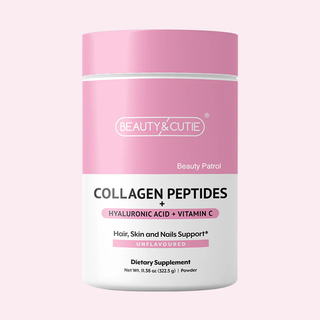Supplements have become a common addition to many people's diets, whether it's to fill nutrient gaps or to boost overall health. But how much do we really know about these dietary supplements? In this blog post, we take a closer look at five things you probably didn't know about supplements. From their various forms to the FDA's role in regulating them, we'll provide you with the information you need to make more informed decisions about the supplements you take. So, let's dive in and learn about the fun facts about vitamins!
What Are Some Interesting Facts About Vitamins?
Your body needs essential vitamins and nutrients to function properly. Here are some interesting facts about vitamins that you may not have known:
- There are 13 different vitamins that your body needs: vitamins A, C, D, E, K, and the B vitamins (thiamine, riboflavin, niacin, pantothenic acid, biotin, vitamin B6, vitamin B12, and folate).
- Vitamins can be classified as either water-soluble or fat-soluble. Water-soluble vitamins (vitamin C and B vitamins) dissolve in water and are not stored in the body, which means you need to consume them on a daily basis. Fat-soluble vitamins (vitamins A, D, E, and K) are stored in the body's fat tissues and liver, so they don't need to be consumed as frequently.
- Not getting enough of certain vitamins can lead to vitamin deficiencies, which can have serious health consequences. For example, a lack of vitamin C can lead to scurvy, a disease that causes weakness, anemia, and bleeding gums.
- Some vitamins can be synthesized by your body, but others cannot. For example, your body can produce vitamin D when your skin is exposed to sunlight, but it cannot produce vitamin C, so you need to get it from your diet.
- It's important to be mindful of your vitamin intake, as an excessive amount of certain vitamins could prove to be harmful to your health. For instance, consuming high levels of vitamin D or vitamin A can lead to toxicity and cause adverse effects on your body.
What Are The Main Sources Of Vitamins?
There are many sources of vitamins, including fruits, vegetables, whole grains, lean proteins, and dairy products. Some specific examples of vitamin-rich foods include citrus fruits for vitamin C, leafy greens for vitamin K, salmon for vitamin D, and carrots for vitamin A. It is important to eat a varied and balanced diet in order to get all of the necessary vitamins for optimal health. Additionally, some people may choose to take vitamin supplements if they are not able to get enough through their diet alone. However, it is important to consult with a healthcare professional before starting any new supplements.
How Do Vitamins Help The Body?
Vitamins play a crucial role in maintaining overall health and wellness. They are essential nutrients that our bodies need to perform various functions, such as supporting our immune system, aiding in the production of energy, and maintaining strong bones and teeth.
Each vitamin has its unique role and benefits. For example, vitamin C is an antioxidant that helps protect our cells from damage, while vitamin D is essential for healthy bone growth and development. Vitamins can be obtained through a well-balanced diet, but sometimes we may need to supplement with additional vitamins to fulfill our nutritional needs. Overall, incorporating vitamins into our daily routine can help us maintain optimal health and prevent potential deficiencies.
What Are The Most Common Vitamin Deficiencies?
There are several common vitamin deficiencies that people may experience, including:
- Vitamin D deficiency: This vitamin is important for strong bones and teeth, as well as overall immune system health. Many people do not get enough vitamin D from sunlight or their diet, and may require supplements.
- Vitamin B12 deficiency: This vitamin is essential for red blood cell production and nervous system function. Vegans and vegetarians are at higher risk of a B12 deficiency, as this vitamin is primarily found in animal products.
- Iron deficiency: Iron is important for red blood cell production and carrying oxygen throughout the body. Women, particularly during pregnancy, may be at higher risk of iron deficiency.
- Vitamin C deficiency: While not as common as the above deficiencies, a lack of vitamin C can lead to problems with skin, teeth, and overall immune system health.
It is important to speak with a healthcare professional if you suspect you may be deficient in any vitamins or minerals, as supplements may be necessary to address the deficiency.
Are There Any Vitamins That Are Particularly Important For Children?
Yes, there are several vitamins that are particularly important for children. These vitamins include:
- Vitamin D: This vitamin is essential for strong bones and teeth. Children who don't get enough vitamin D may be at risk for rickets, a condition that causes weak and soft bones.
- Vitamin C: This vitamin is important for the growth and repair of tissues in the body. It also helps the body absorb iron from plant-based foods.
- Vitamin A: This vitamin is important for good vision, healthy skin, and a strong immune system. Children who don't get enough vitamin A may be at risk for night blindness.
- B vitamins: B vitamins are important for energy production, brain function, and the production of red blood cells. Children who don't get enough B vitamins may be at risk for anemia.
It's important for children to eat a balanced diet that includes a variety of fruits, vegetables, whole grains, lean proteins, and healthy fats to ensure they get all the vitamins and minerals they need. If you're concerned that your child isn't getting enough vitamins, talk to their pediatrician about whether a vitamin supplement may be necessary.
Is It Possible To Get Too Much Of a Certain Vitamin Through Diet?
Yes, it is possible to get too much of a certain vitamin through diet. This condition is known as hypervitaminosis and it can occur when you consume excessive amounts of a particular vitamin.
The symptoms of hypervitaminosis vary depending on the vitamin in question but can include nausea, vomiting, diarrhea, skin irritation, and even organ damage in severe cases. It is important to maintain a balanced and varied diet and to consult with a healthcare professional before taking any vitamin supplements to avoid the risk of overconsumption.
It is also important to note that fat-soluble vitamins, such as vitamins A, D, E, and K, can accumulate in the body over time and may pose a greater risk of hypervitaminosis compared to water-soluble vitamins. Therefore, it is particularly important to be cautious when taking supplements containing these vitamins.
What Is The Recommended Daily Allowance For Each Vitamin?
The recommended daily allowance for each vitamin varies depending on factors such as age, gender, and overall health. Here are some examples:
- Generally, the recommended daily allowance for vitamin A is 700-900 micrograms for men and 600-700 micrograms for women.
- For vitamin B1, the recommended daily intake is 1.1-1.2 milligrams for men and women.
- Vitamin B2 has a recommended daily allowance of 1.3-1.7 milligrams for men and women.
- The recommended daily allowance for vitamin B3 is 14-16 milligrams for men and 11-12 milligrams for women.
- Vitamin B5 has a recommended daily intake of 5 milligrams for both men and women. For vitamin B6, the recommended daily allowance is 1.3-1.7 milligrams for men and women.
- Vitamin B7 has a recommended daily intake of 30 micrograms for both men and women.
- The recommended daily allowance for vitamin B9 is 400 micrograms for men and women.
- Lastly, for vitamin B12, the recommended daily intake is 2.4 micrograms for both men and women.
It is important to note that these recommendations may change based on individual needs and health conditions, and it is always best to consult with a healthcare professional before starting any new supplement regimen.
Conclusion
In conclusion, while dietary supplements may offer benefits for some individuals, it is important to approach them with caution and awareness. The lack of FDA approval and regulation for efficacy and safety means that it is up to the consumer to research and choose supplements wisely, consulting with healthcare professionals if necessary.
Additionally, the risk of hypervitaminosis and other adverse effects underscores the importance of maintaining a balanced and varied diet and avoiding overconsumption of specific vitamins. By being informed and responsible when it comes to dietary supplements, individuals can make choices that support their overall health and well-being.
Final Thoughts
Beauty begins with nourishment, and Beauty and Cutie’s collagen powders are the key. Formulated to enhance your skin's elasticity, strengthen your nails, and boost hair health, our collagen blend supports natural beauty at its best. Give your body the collagen boost it craves and let your confidence shine with Beauty and Cutie!
Sources
- https://www.ncbi.nlm.nih.gov/books/NBK538510
- https://www.cancer.gov/publications/dictionaries/cancer-terms/def/fat-soluble-vitamin
- https://www.healthline.com/nutrition/can-you-overdose-on-vitamins
- https://www.webmd.com/vitamins-and-supplements/vitamins-minerals-how-much-should-you-take
*These statements have not been evaluated by the Food and Drug Administration. This product is not intended to diagnose, treat, cure or prevent any diseases.


